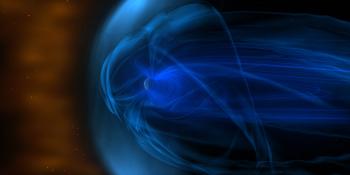Viewing archive of Wednesday, 28 November 2001
Solar activity report
Any mentioned solar flare in this report has a scaling factor applied by the Space Weather Prediction Center (SWPC). Because of the SWPC scaling factor, solar flares are reported as 42% smaller than for the science quality data. The scaling factor has been removed from our archived solar flare data to reflect the true physical units.
Report of Solar-Geophysical Activity 2001 Nov 28 2200 UTCPrepared by the NOAA © SWPC and processed by SpaceWeatherLive.com
Joint USAF/NOAA Report of Solar and Geophysical Activity
SDF Number 332 Issued at 2200Z on 28 Nov 2001IA. Analysis of Solar Active Regions and Activity from 27-2100Z to 28-2100Z
Solar activity was at high levels. Region 9715
(N05E17) produced a major flare during the period. This impulsive
M6/1b event peaked at 28/1635 UTC, and was associated with a Type II
radio sweep that had an estimated shock velocity of 674 km/s, a Type
IV radio sweep, and a 450 pfu tenflare. This event also produced a
partial halo CME based on SOHO/LASCO imagery. Other notable flares
from this region were an M2/1f flare at 27/2121 UTC and a C7 x-ray
flare (optically correlated using SXI imagery) at 28/1543 UTC with
an associated Type II radio sweep that had an estimated shock
velocity of 889 km/s. Region 9715 continues to show significant
growth as evidenced by a delta configuration magnetic classification
that has become evident during the period. Four new regions were
numbered today, Regions 9718 (S07E70), 9719 (N03E03), 9720 (S18E72),
and 9721 (N10E78).
IB. Solar Activity Forecast
Solar activity is expected to be at
moderate to high levels.
IIA. Geophysical Activity Summary 27-2100Z to 28-2100Z
The geomagnetic field was at quiet to unsettled levels. The greater
than 10 MeV proton event that began on 22/2320 UTC, ended at 28/2100
UTC (max pfu of 18,900 occurred at 24/0555 UTC).
IIB. Geophysical Activity Forecast
The geomagnetic field is
expected to be at quiet to unsettled levels through most of the
forecast period. The partial halo CME from the M6/1b (mentioned in
1A above) is expected to pass late on day three with brief minor
storming periods possible.
III. Event Probabilities 29 Nov to 01 Dec
| Class M | 75% | 75% | 75% |
| Class X | 20% | 20% | 25% |
| Proton | 15% | 20% | 25% |
| PCAF | green | ||
IV. Penticton 10.7 cm Flux
Observed 28 Nov 199 Predicted 29 Nov-01 Dec 205/210/220 90 Day Mean 28 Nov 217
V. Geomagnetic A Indices
Observed Afr/Ap 27 Nov 001/002 Estimated Afr/Ap 28 Nov 004/004 Predicted Afr/Ap 29 Nov-01 Dec 004/005-006/008-012/015
VI. Geomagnetic Activity Probabilities 29 Nov to 01 Dec
| A. Middle Latitudes | |||
|---|---|---|---|
| Active | 10% | 10% | 35% |
| Minor storm | 01% | 01% | 10% |
| Major-severe storm | 01% | 01% | 05% |
| B. High Latitudes | |||
|---|---|---|---|
| Active | 15% | 15% | 40% |
| Minor storm | 01% | 01% | 15% |
| Major-severe storm | 01% | 01% | 05% |
All times in UTC
Currently there's no noteworthy space weather
Latest news
Latest forum messages
Ask your obscure/"stupid" space weather questions. 381Space Weather Memes 703Filaments and prominences 115AR 4055 121Growth of Cycle 25 834
More topicsSupport SpaceWeatherLive.com!
A lot of people come to SpaceWeatherLive to follow the Sun's activity or if there is aurora to be seen, but with more traffic comes higher server costs. Consider a donation if you enjoy SpaceWeatherLive so we can keep the website online!

Latest alerts
Thursday, 24 April 2025
07:27 UTC - Hemispheric Power Index
The OVATION model predicts the Hemispheric Power Index to reach 50GW at 08:15 UTC
07:15 UTC - Geomagnetic activity
Active geomagnetic conditions (Kp4) Threshold Reached: 07:03 UTC
06:27 UTC - Coronal mass ejection arrival
CME impact detected - Current Solar Wind Speed 644km/sec - IMF: Bt (strength): 15nT & Bz: 0nT (South).
Space weather facts
| Last X-flare | 2025/03/28 | X1.1 |
| Last M-flare | 2025/04/22 | M1.3 |
| Last geomagnetic storm | 2025/04/21 | Kp5+ (G1) |
| Spotless days | |
|---|---|
| Last spotless day | 2022/06/08 |
| Monthly mean Sunspot Number | |
|---|---|
| March 2025 | 134.2 -20.4 |
| April 2025 | 122.8 -11.4 |
| Last 30 days | 117.7 -15.6 |




